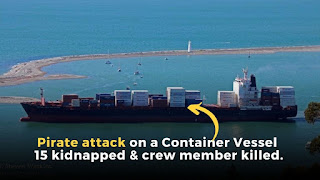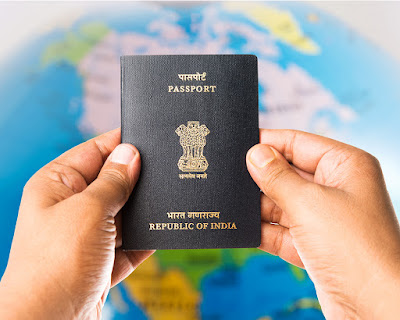Pirates attack on a container vessel 15 kidnapped and crew members killed . maritime news
Gulf Of Guinea emerging Pirates safe heaven.
One killed and 15 seafarers kidnapped in pirate attack on container ship in the Gulf of Guinea.
On Saturday morning, a boxship was reportedly boarded by pirates and its citadel breached at a position off Sao Tome, according to security consultancy Praesidium International.
Praesidium reports that at about 0530 hours on Saturday morning, the Turkish-operated container ship Mozart was transiting about 95 nm to the northwest of Sao Tome when she was boarded by four armed assailants. The crew retreated to the vessel's citadel, but the pirates managed to breach it.
15 crewmembers were kidnapped and one was killed in the altercation, vessel operator Boden Maritime confirmed in a statement. The victim has been identified as engineer Farman Ismayilov, an Azerbaijani national.
Crewmembers and security sources told Reuters that the attack was well-coordinated and sophisticated, and the assailants may have used explosives to breach the citadel. According to Turkey's maritime directorate, the pirates were aboard and working on the abduction for six hours, with no reported law enforcement or military interference. They successfully escaped with the victims.
The remaining three crewmembers are in control of the vessel and are proceeding to Port-Gentil, Gabon. One of them sustained shrapnel wounds in the attack, according to Turkish state media.
Anadolu reports that the vessel's bridge equipment were damaged by the attackers, and the remaining crew has limited means to navigate safely back to port.
The president of Turkey, Recep Tayyip Erdogan, has spoken twice with one of the vessel's officers about the attack, according to Anadolu. Turkish diplomatic efforts to secure the release of the survivors are currently under way.
Systemic risk
Piracy is a routine threat in the Gulf of Guinea, and the region has become the world's epicenter for maritime kidnapping. Over the past several years, experienced criminals and insurgents from the Niger River Delta have transitioned away from fuel theft in favor of seafarer abduction, ranging hundreds of miles from Nigerian shores to attack vessels off the coasts of neighboring countries. Attacks have been reported as far as 200 nm offshore.
A patchwork of national regulation interferes with the use of embarked private maritime security contractors (PMSCs), and many vessels sail through the region undefended. In particular, the Nigerian Navy has repeatedly used Nigerian antipiracy laws to target suspected private security guards.
PMSCs were a major factor in the effort to end piracy in the high-risk area off Somalia. Nigeria only permits private contractors to provide for-hire Security Escort Vessel (SEV) services using civilian boats and armed Nigerian Navy active duty servicemembers. According to one well-regarded security services firm, this system has historically been challenged by "extremely high costs and issues of poor performance and reliability."
Delays are Growing with Increasing Reports of Rollover Cargo Worldwide For months, shippers, ports, and carriers have all highlighted the challenges they faced in response to the surge in container shipping volumes during the second half of 2020. Data analytics firm Ocean Insights released new data highlighting just how extensive the delays have been, which ports and carriers are experiencing under capacity, and a timeline of market volatility.
During December, Ocean Insights reports that on average 37 percent of containers overall were delayed in the major cargo regions of Europe, the US, and Asia as well as less cargo intensive regions such as Latin America. According to Ocean Insights, on average, more than one in three containers is being rolled over based on the percentage of cargo carried by each line globally that left a port on a different vessel than originally scheduled.
“Ocean Insights’ cargo delay statistics show how the bull run is wreaking havoc on the market,” the company said in reporting its data. The result is delays and unpredictability of shipments and cargo laying stranded in the ports creating further chokepoints and backlogs. “Much of the recent concern for rollover cargo has focused on reefer containers,” highlights Ocean Insights. One consequence they are highlighting is reports that some ports in China have run out of the power ports used to supply electricity to reefer containers, jeopardizing perishable cargo.
“Of the 20 global ports for which Ocean Insights collates data, 75 percent saw an increase in the levels of rollover cargo in December compared to the previous month,” said Ocean insights’ Chief Operations Officer Josh Brazil. “Major transshipment facilities such as Port Klang in Malaysia and Colombo in Sri Lanka recorded 50 percent or more of cargo delayed, with the world’s largest transshipment hub in Singapore and leading primary ports such as Shanghai and Busan rolling over more than a third of their containers, last month.”
While there has been extensive reporting about the shortage of containers and the efforts the shipping lines have been making to reposition the boxes, Ocean Insights highlights that it is only one of the consequences of the current conditions. “Today, even if a beneficial cargo owner can get an empty container for their cargo, there is no guarantee that the cargo will make it onto a ship,” the report highlights.
The performance, of course, varies widely by individual ports in part due to the number of actual containers moving through the port. However, the raised level of demand is creating new challenges even for ports that had been making progress. For example, they cite, the extra loader policy in South Korea’s Busan Port, which saw a four percent reduction in its rollover levels in November, only to lose most of those gains in December.
The major ocean shipping companies are also experiencing similar increases in rollover values with the average rising from 35 percent in November to 37 percent in December. However, according to Ocean Insights, three lines left more than half their booked cargo at the departure port. Alliance partners MSC and Maersk they report managed to stem the rise of the rollover cargo month on month, both recording the same level of rollovers in December as in the previous month, while HMM, which had been successful in limiting its rollover cargoes, saw its rate double in December as volumes surged.
With industry experts are now warning that the cargo surge could last well into 2021, Ocean Insights concludes that there is a strong likelihood that the prevailing conditions will continue throughout the first half of the year.
Thanks pls share it to all seafarer.
All copyright ©️ reserved under 107 section.





Comments
Post a Comment